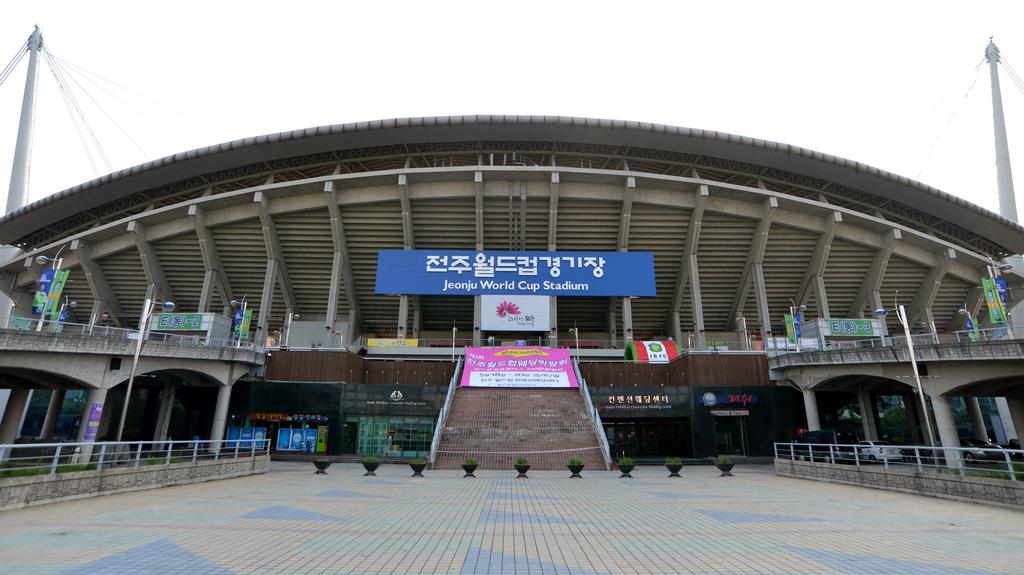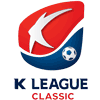'Largely unknown' South Korea league kicks off football's post-virus era

The towering stands of the 42,477-capacity Jeonju World Cup Stadium stood empty on Friday as South Korea opened football's post-coronavirus era without fans, but with an unprecedented international TV audience.
With most leagues worldwide sidelined by the pandemic, the K-League is the first competition of any standing to come back to life and a host of safety precautions have been imposed, with wild goal celebrations and even talking discouraged.
The long-delayed season-opener between defending champions Jeonbuk Motors and Cup-holders Suwon Bluewings was watched by sport-starved fans in a swathe of foreign countries, even though spectators are not yet allowed at K-League games.
Only the media section of the stadium, which hosted three matches of the 2002 World Cup, was occupied.
Paper sheets taped to stadium seats spelled out "#C_U_SOON" and "STAY STRONG", while one end was draped in a giant green banner for the Mad Green Boys, the Jeonbuk fan club.
Once the match began, filling the site were the sounds of players shouting calls and ball kicks that would have been buried under fans' thundering chanting during normal times.
The match was punctuated with intermittent playing of Jeonbuk fan club's recorded chants via speakers.
The season's opening goal was a header by veteran striker Lee Dong-gook of Jeonbuk in the eighty-third minute.
Lee celebrated the scoring by posing with teammates as excessive celebration involving close physical contact is banned by K-League's safety guidelines.
Using sign language they expressed their "respect" for medical workers treating coronavirus patients.
Jeonbuk maintained the 1-0 lead till the end.
Before and after the match the players bumped fists instead of handshakes as advised.
The match, played under stringent safety guidelines, is the first glimpse of post-virus football and similar scenes are likely elsewhere as other leagues get under way.
All personnel entering the stadium had their temperatures checked and were required to wear face masks, and hand sanitisers were located throughout the venue.
Players have been told to avoid excessive goal celebrations, handshakes, close talking and blowing their noses.
With fans around the world long deprived of live sport, the K-League, whose start was delayed two months by the pandemic, has signed season-long rights deals with broadcasters who will show games live in 36 countries and territories including Britain, Germany and Australia.
And the BBC secured a one-off deal for the opening match, which was livestreamed on its website.
"Football is back!" the British broadcaster proclaimed, noting it had been 59 days since the last Premier League match.
Last year the K-League sold rights to only six countries, all of them in Asia.
"Because we had limited exposure to international fans, it is true that the K-League was largely unknown globally despite its competitiveness," said league spokesman Lee Jong-kwoun.
"2020 will be the first year the league will be recognised and assessed on a global level."
The K-League's progress will be watched closely by other leagues including the giants of Europe, where Germany's Bundesliga is the only competition so far to set a date to return, on May 16.
Players and coaching staff will have their temperatures checked before each game and anyone at 37.5 C (99.5 F) or more will be isolated and tested.
If anyone gets infected during the season, their team and those who played against them will have to take a two-week break.
And instead of the traditional pre-game handshakes, players have been asked to bow their heads from a distance.
South Korea endured one of the worst early outbreaks of COVID-19 outside China, prompting professional sports to suspend or delay their seasons, a pattern that was repeated worldwide.
But the country appears to have flattened the curve thanks to an extensive "trace, test and treat" programme, and football's return comes after baseball started this week, also without fans.
Life in South Korea has returned largely to normal, with workers going back to offices this week under eased social distancing rules, while a stay-on-base order on its 600,000 strong military was lifted, allowing conscripts to go on leave.
Schools will start re-opening next week.
Authorities reported 12 fresh coronavirus cases Friday, taking the total to 10,822.
The K-League said spectators will be allowed back into stadiums progressively as the government eases its distancing measures.
The new football season comes just three days after the return of professional baseball in South Korea, which has struck a television deal with ESPN for US fans.






